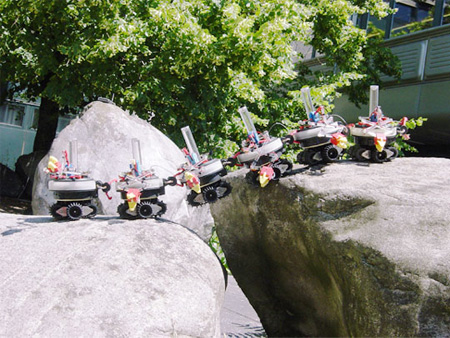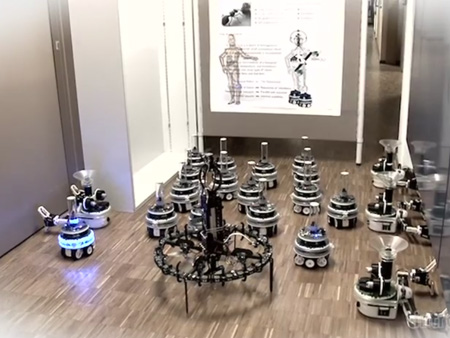SCHWARMANOID Project


- Offer Profile
- IRIDIA is the Artificial
Intelligence research laboratory of the Université Libre de Bruxelles. It is
deeply involved in theoretical and applied research in computational
intelligence.
The major domains of competence are: swarm intelligence, metaheuristics for the solution of combinatorial and continuous space optimization problems, the foundational study of biological networks, and business intelligence applications.
Product Portfolio
Research
Swarm Intelligence
- Swarm intelligence is an artificial intelligence
technique that involves the design of algorithms or distributed
problem-solving mechanisms using the collective behavior of social insect
colonies and other animal societies as inspiration. Swarm intelligence
systems are typically made up of a population of simple agents interacting
locally with one another and with their environment. IRIDIA is a world
leader in two of the most successful areas of research in swarm
intelligence: Ant colony optimization (ACO) and Swarm robotics.
ACO is a metaheuristic optimization algorithm that can be used to find approximate solutions to difficult combinatorial optimization problems. In ACO, artificial ants build solutions by moving on a map of the problem space. Mimicking real ants, they deposit artificial pheromone on the map of the problem space in such a way that future artificial ants can build better solutions. ACO has been successfully applied to an impressive number of optimization problems.
Swarm robotics involves the application of swarm intelligence principles to large collections of robots. The recently completed SWARM-BOTS and SWARMANOID projects succeeded in producing a viable distributed robotic systems based on the swarm robotics methodology. ANTS
- Towards a Foundation of Ant Algorithm
COMP²SYS
- COMPutational intelligence methods for COMPlex SYStems
E-SWARM
- E-SWARM: Engineering Swarm Intelligence System
MIBISOC
- Medical Imaging Using Bio-inspired and Soft Computing
ASCENS
- Autonomic service-component ensembles

Swarm-bots
- Swarm-bots is a project sponsored by the Future and
Emerging Technologies program of the European Commission (IST-2000-31010),
aimed to study new approaches to the design and implementation of
self-organizing and self-assembling artifacts.
The project, that lasted 42 months, was successfully completed on March 31, 2005. Since October 1, 2006, the Swarmanoid project is extending the work done in the Swarm-bots project to three dimensional environments.
Professor Marco Dorigo, the project coordinator and one of the founders of the swarm intelligence and swarm robotics research fields, has been awarded, in November 2003, the First EU Marie Curie Award, and in November 2005, the prestigious «FNRS Prize - Prix Dr A. De Leeuw-Damry-Bourlart», worth 75,000 EUR, for his contributions to artificial intelligence and robotics.
Dr. Francesco Mondada, one of the main designers of the swarm-bot at EPFL, Lausanne, has been awarded, in November 2005, the Swiss Latsis University prize, worth 16,500 EUR, for his contributions to bio-inspired robotics.

Swarmanoid
- The Swarmanoid project (IST-022888) is a Future and
Emerging Technologies (FET-OPEN) project funded by the European Commission.
The main scientific objective of this research project is the design, implementation and control of a novel distributed robotic system. The system will be made up of heterogeneous, dynamically connected, small autonomous robots. Collectively, these robots will form what we call a swarmanoid. The swarmanoid that we intend to build will be comprised of numerous (about 60) autonomous robots of three types: eye-bots, hand-bots, and foot-bots.
The Swarmanoid project is the successor project to the Swarm-bots project, and builds on the results obtained during the Swarm-bots project.
The project coordinator is Professor Marco Dorigo.
Professor Marco Dorigo, the project coordinator and one of the founders of the swarm intelligence and swarm robotics research fields, has been awarded, in November 2007, the "CajAstur International Prize for Soft Computing".
Metaheuristics
- Metaheuristics are widely used to solve important
practical optimization problems. A metaheuristic can be seen as a general
algorithmic framework which can be applied to different optimization
problems with relatively few modifications to make them adapted to a
specific problem. Examples of metaheuristics include ant colony
optimization, evolutionary computation, iterated local search, simulated
annealing, and tabu search.
Our research focus is on specific metaheuristics like ant colony optimization or iterated local search, and on their application to NP-hard and to continuous optimization problems. We are particularly interested in optimization problems which are dynamic, multi-objective and stochastic. A central point in our research is the application of a sound experimental methodology and the development of tools for the empirical study and configuration of metaheuristics.
Metaheuristics are an important class of algorithmic methods belonging to the stochastic local search framework. We are particularly interested in developing an engineering methodology for the design and implementation of stochastic local search algorithms and, hence, also of metaheuristics. ANTS
- Towards a Foundation of Ant Algorithm
COMP²SYS
- COMPutational intelligence methods for COMPlex SYStems
MetaHeuristics
- Metaheuristics network
MIBISOC
- Medical Imaging Using Bio-inspired and Soft Computing
Bioinformatics
- IRIDIA is involved several areas of bioinformatics. One of them is the computational study of biological networks such as neural networks, immune networks or chemical reaction systems. We are trying to identify common features and common mechanisms in all of them. All these networks appear to grow in a similar manner, leading to similar topology. They all show an interdependency between their structural continuous alteration (topology, nodes and connections) and their internal dynamics (fixed points, oscillations or chaos). Their plasticity is the main reason behind their adaptability in the complex and always changing environment which surrounds these networks. Accordingly, we are also attempting to draw possible inspirations from their modelling for the conception of adaptive distributed engineering artefacts.
BIGRE
- Bioinformatics Grid Resources and Environments
InSilico
- The in Silico Wet Lab
MBSTDTG
- Molecular bases of signal transduction diseases of thyroid gland
SMART
- Statistical Monitoring Applied to Research Trials
Business Intelligence
- IRIDIA is involved in the development of methodological support for data and text mining, adaptive control of complex systems (using fuzzy logic and neural networks) and object oriented developments. We have a large record of industrial realizations using data mining for defect recognition and time series prediction. We are teaching object oriented technologies and assisting industries, administrations and researchers in biology and chemistry to acquire and master the object oriented technology.
TABELLIO